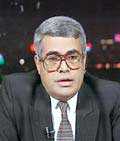|
Hariri Report Paves Way for Disarming Palestinians: Experts
 |
|
UNRWA
has registered at least 394.532 Palestinian refugees living in Lebanon,
in addition to other thousands who have not been registered.
|
By
Ahmed Fathy, IOL Staff
CAIRO,
October 23, 2005 (IslamOnline.net) – Political pundits believe the
UN report about the killing of ex-Lebanese premier Rafiq Al-Hariri
plays into the hands of those pressing for the disarming of
Palestinian refugee camps, with one expert seeing the report as part
of a scheme to settle the refugees in Lebanon.
"The
report reference to the involvement of Palestinians creates an
atmosphere conducive to the disarming of Palestinian refugee camps and
consequently eliminating any possible resistance for Israel inside
Lebanon," Lebanese political analyst Talal Atrissi told
IslamOnline.net.
German
judge Detlev Mehlis, leading an international team investigating the
massive bomb blast that killed Hariri and 20 others in Beirut in
February, said members of the Damascus-based Popular Front for
Liberation of Palestine – General Command coordinated with Syrian
and Lebanese officials in planning the bombing.
PLFP
leader Ahmed Jebril refuted the allegation in a telephone interview
with IOL on Friday, October 21.
Difficult
Qasim
Qasir, another Lebanese political analyst, concurred.
He
said the reference to the Palestinians in the Mehlis report would
"speed up handling the issue of Palestinian arms in
Lebanon."
The
two pundits agreed that disarming the Palestinian camps would not be
an easy task.
"There
is no Lebanese consensus on the need to disarming the Palestinian
camps," said Atrissi.
"The
Lebanese also disagree on the priority of this issue at the current
political turmoil."
The
Lebanese expert maintained that the country's army "does not have
the capabilities needed" to disarm the Palestinians by force.
"The
army will pay dearly if forcing the Palestinians to lay down their
arms and such a situation would have security and political
repercussions," said Atrissi.
"The
issue of Palestinian arms in Lebanon needs to be handle through
in-depth dialogue away from foreign intervention and propaganda."
Qasir
also ruled out a possible military solution to the issue, citing
ongoing Lebanese-Palestinian discussions.
"There
is almost a consensus that Palestinian arms should not go outside the
refugee camps because they are unneeded and that arms inside the camps
should be managed but not disarmed."
Earlier
this month, Lebanese Prime Minister Fouad Seniora received two
Palestinian delegations separately on regulating Palestinian arms.
The
Lebanese government stressed that Palestinian arms would not be
tolerated outside the camps.
Settlement
 |
|
Nafa’a said the Mehlis report gives the US a golden chance to push for settling Palestinian refugees in Lebanon.
|
Hassan
Nafa’a, an Egyptian political science professor, had a different
reading of the Mehlis report.
"The
Palestinian reference provides a golden opportunity for the US to
achieve its agenda, particularly the settlement of Palestinian
refugees in Lebanon," he told IOL.
He
said Washington would first push for the disarming of Palestinians
before moving on with the settlement scheme.
"The
Mehlis report is part of the US plan to upset the political equation
in Lebanon though an anti- Syria and anti- Palestine government that
would help the US disarm Palestinians and eventually help settle the
Palestinians in Lebanon."
US
President George Bush had triggered Arab wrath by saying Palestinian
refugees could not return to land lost in 1948.
One
of the floated scenarios is to settle Palestinian refugees in their
current host countries, particularly Lebanon.
The
UN Relief and Works Agency for Palestine Refugees in the Near East
(UNRWA) has registered at least 394.532 Palestinian refugees living in
Lebanon, in addition to other thousands who have not been registered.
They
reside in 12 camps through out Lebanon, the biggest being Ein
El-Hilweh refugee camp in Saida. All camps are overcrowded and lack
the basic infrastructure.
While
some Lebanese blame the Palestinians for their civil war, others argue
that the settlements of Palestinians, most Sunnis, would disrupt
Lebanon's sectarian-based political balance.
|